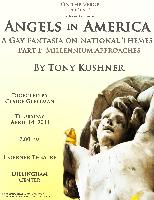On the Verge presents a staged reading of Angels in America: A Gay Fantasia on National Themes, Part 1, by Tony Kushner
04/13/11
Contributed by Claire Gleitman
 On Thursday, April 14th, at 7 p.m., the On the Verge reading series will present a staged reading of Angels in America: A Gay Fantasia on National Themes, Part 1: Millennium Approaches, by Tony Kushner. The reading will take place on the Hoerner Stage in Dillingham Center. It was directed by Claire Gleitman, a faculty member in the department of English, and its cast includes Greg Bostwick and Kathleen Mulligan, professors of Theatre, and students from the department of Theatre.
On Thursday, April 14th, at 7 p.m., the On the Verge reading series will present a staged reading of Angels in America: A Gay Fantasia on National Themes, Part 1: Millennium Approaches, by Tony Kushner. The reading will take place on the Hoerner Stage in Dillingham Center. It was directed by Claire Gleitman, a faculty member in the department of English, and its cast includes Greg Bostwick and Kathleen Mulligan, professors of Theatre, and students from the department of Theatre.
Angels in America, which takes place between 1985 and 1990, was written in the early 1990s, when the Reagan years, the beginnings of the AIDS crisis, the fall of the Berlin Wall and the Chernobyl disaster were all recent memories. As we revisit Angels nearly twenty years later, the moment that it depicts may no longer feel, in the same immediate sense, to be our own. Yet the play’s sweep has always extended far beyond the particular moment that it dramatizes. Self-consciously placing himself in dialogue with American authors such as Emerson, Whitman and Williams, Kushner invokes a variety of what he calls “national themes”; thus, he situates his historical moment in the context of a larger inquiry into the nature of the American character. At the heart of the play is an exploration of journeying as a quintessentially American impulse: Kushner’s characters light out in various directions, while often leaving their best selves behind. Tightly linked to the tension between movement and standing still is the play’s incisive indictment of the individualist ethic that defined American politics in the Reagan years. The impulse to abandon that the characters manifest has trickled down to them from a political system in which the abandonment of the weak and the afflicted is public policy; the sense of community that prompts human beings to feel responsible for one another has frayed, leaving individuals defenseless and alone. It is in this sense that the character Harper’s vision of the ozone layer as “guardian angels, hands linked,” forming “a spherical net,” stands at the play’s poetic core. Hands have come unloosed in Angels, the social safety net has dissolved and “heartless terror” reigns. Yet we can see glimpses in Millennium of what will become clearer in Perestroika: that aimless migration can become transformative movement through ferocious acts of the imagination, and “painful progress” becomes possible by virtue of compassion and an unyielding, collective will.
The reading is free and open to the public.
0 Comments
https://www.ithaca.edu/intercom/article.php/20110411164649696
 On Thursday, April 14th, at 7 p.m., the On the Verge reading series will present a staged reading of Angels in America: A Gay Fantasia on National Themes, Part 1: Millennium Approaches, by Tony Kushner. The reading will take place on the Hoerner Stage in Dillingham Center. It was directed by Claire Gleitman, a faculty member in the department of English, and its cast includes Greg Bostwick and Kathleen Mulligan, professors of Theatre, and students from the department of Theatre.
On Thursday, April 14th, at 7 p.m., the On the Verge reading series will present a staged reading of Angels in America: A Gay Fantasia on National Themes, Part 1: Millennium Approaches, by Tony Kushner. The reading will take place on the Hoerner Stage in Dillingham Center. It was directed by Claire Gleitman, a faculty member in the department of English, and its cast includes Greg Bostwick and Kathleen Mulligan, professors of Theatre, and students from the department of Theatre.